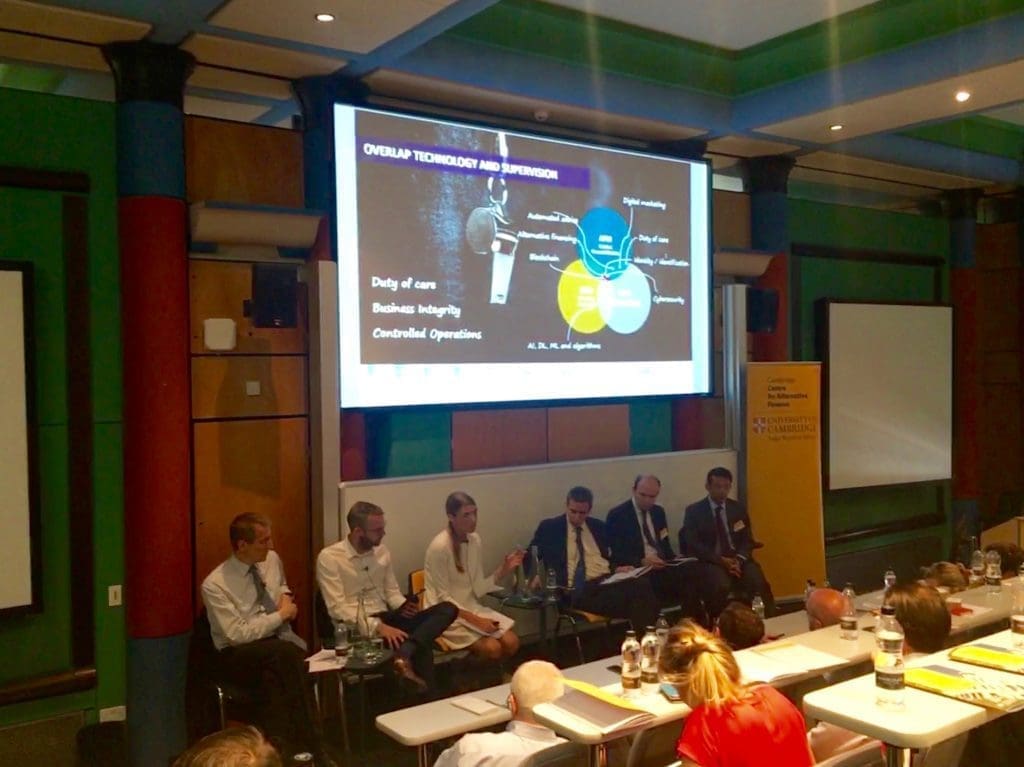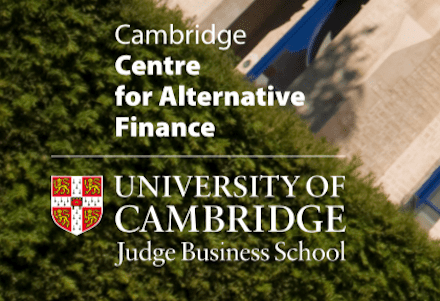Last week I traveled to the University of Cambridge in the UK for the third annual conference put on by the Cambridge Centre for Alternative Finance. I have had a close relationship with the founders of “The Centre”, as it is known, since its inception and I really appreciate the work they do furthering the fintech industry. We have covered their global reports extensively on Lend Academy.
The Centre is the world’s leading academic research facility, at least outside of China, for the fintech industry. Their data gathering and analysis is second to none and the reality is there is simply no one else gathering this kind of data on a global scale.
Anyway, on to the highlights their event which was titled, Reimagining Alternative Finance: Global Perspectives and Local Insights. As the name implies there was very much an international flavor to the event with speakers from more than a dozen countries.
Greg Medcraft is the former head securities regulator in Australia and is now the Director of the Directorate for Financial and Enterprise Affairs of the OECD. He talked about trust and how trust in business is low today, particularly in finance. The power of the crowd is impacting trust where companies misdeeds are amplified and public opinion can turn against a company quite quickly. One of the antidotes to this is distributed ledger technology that can create networks with more trust, transparency and traceability.
We heard via video conference from Her Majesty Queen Maxima of the Netherlands who is the UN Secretary General’s Special Advocate for Inclusive Finance for Development and a passionate voice for financial inclusion. She celebrated the fact that since 2011 around one billion people have moved from unbanked to banked for the first time. She gave some examples of work being done in developing countries and she called on the fintech industry to do more. As I have said before the real promise of fintech is to help the underserved in the same way that we help the already well served.
Probably the country with the biggest success story when it comes to financial inclusion is Kenya. While I have heard the story of M-Pesa before I have never heard it from the person that was in charge of overseeing the economy as it was transforming Kenya. Professor Njuguna Ndung’u was the Governor of the Central Bank of Kenya from 2007 to 2015 during which time M-Pesa went from a curiosity to having half of the country’s GDP flowing through its platform. The introduction of such a system was a major challenge for central bankers as they worried about KYC concerns and financial instability. But it has been a huge win for Kenya with financial inclusion improving dramatically, particularly when it comes to women. They are now focused on extending M-Pesa so that it can become a vehicle for saving and investing.
Ann Cairns is the Vice Chairman of Mastercard and she was the closing keynote speaker. She also talked about financial inclusion and the power of public-private partnerships. I didn’t realize this but when Mastercard went public in 2006 with a valuation of $5 billion they put 10% of the stock into the Mastercard foundation. Now Mastercard is valued at $200 billion and the foundation has around $20 billion in assets making it one of the largest foundations in the world. Ann talked about some of the innovations happening at the point of sale. She said that biometrics (voice and fingerprint) will replace chip and pin technology in developing countries and this was enabled by public-private partnerships.

There were also many great panels throughout the day. We had a surprisingly interesting regulatory panel on the challenges that regulators have in keeping up with financial innovation. Nick Cook of the FCA shared the work they have been doing with their tech sprints (or hackathons). Alan Elizondo of the Central Bank of Mexico talked about the collaboration between the Mexican congress and the fintech platforms that results in the new fintech legislation there in March.
There was also a fascinating panel on AI and Machine Learning led by Jesse McWaters of the World Economic Forum. One of the key takeaways here is the importance of targeted deployments of AI with some successful examples of just that discussed on the panel. I really enjoyed the financial inclusion panel where we heard from heads of international development banks on challenges they are facing on the ground. To bridge the gap for the remaining unbanked and underbanked internet connectivity must be addressed first.
I thoroughly enjoyed my time in Cambridge, sitting in on the sessions and meeting many new and interesting people. Kudos to Bryan Zhang, Robert Wardrop and the entire Cambridge Centre for Alternative Finance team for another great event.



